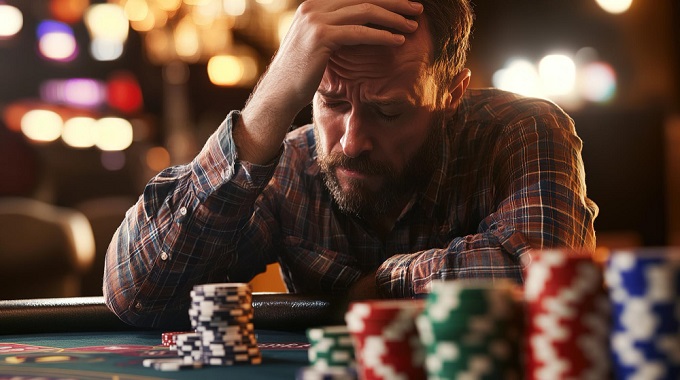


Gambling and Mental Health
|
The intersection of gambling and mental health is a complex issue that warrants attention. The appeal of uncertainty and the thrill of chance can be compelling, but it is important to consider the potential impact on well-being. Gambling can have significant consequences beyond financial losses, potentially affecting emotional stability and overall mental health.The intersection of gambling and mental health is a complex issue that warrants attention. The appeal of uncertainty and the thrill of chance can be compelling, but it is important to consider the potential impact on well-being. Gambling can have Winbox significant consequences beyond financial losses, potentially affecting emotional stability and overall mental health. It is crucial to reflect on how gambling habits may be influencing mental well-being, as this relationship can be intricate and impactful. Taking a measured approach to understanding these dynamics can provide valuable insights into the potential effects of gambling on mental health. Impact of Gambling on Mental HealthGambling has a significant impact on mental health. The thrill of winning can lead to a cycle of addiction, affecting emotional well-being. The constant risk and uncertainty in gambling can trigger anxiety and stress, impacting overall mental state. As losses mount, feelings of guilt, shame, and despair may emerge, potentially leading to depression and, in extreme cases, thoughts of suicide. Relationships can suffer due to gambling preoccupation, straining connections with loved ones. Financial consequences of gambling can also cause distress, worsening mental health issues. It’s crucial to acknowledge these effects and seek help for oneself or others facing mental health challenges related to gambling. Signs of Gambling AddictionGambling addiction can have a significant impact on mental health, often leading to a compulsive cycle that’s important to identify. Common signs of gambling addiction include: - The inability to control or stop gambling - Prioritizing gambling over obligations - Feeling restless or irritable when attempting to reduce gambling - Continuing to gamble to chase losses - Hiding the extent of gambling activities - Seeking financial assistance from others due to gambling losses - Putting relationships, employment, or education at risk due to gambling Recognizing these signs is crucial for addressing the issue effectively and seeking appropriate support. If you or someone you know displays these signs, it may indicate a gambling addiction that requires intervention and assistance. Coping Strategies for GamblersImplementing healthy coping strategies is crucial for individuals dealing with gambling addiction. One effective approach is to restrict access to money and credit cards to prevent impulsive gambling. Establishing firm budgets and financial boundaries can assist in controlling the urge to gamble excessively. Engaging in alternative activities such as exercise, hobbies, or socializing with loved ones can help divert attention from gambling triggers. Building a support network of friends, family, or a support group can offer encouragement and accountability. Mindfulness techniques like meditation or deep breathing exercises can aid in managing stress and resisting the temptation to gamble. It’s important to focus on healthier ways to manage emotions and stressors to successfully overcome gambling addiction. Seeking Professional HelpIf you’re struggling to manage your gambling behavior, it may be beneficial to consider seeking help from a mental health professional or counselor specializing in addiction. These professionals can offer support and guidance to address the underlying issues that may be contributing to your gambling habits. They can assist you in developing healthier coping mechanisms, managing urges, and navigating any emotional challenges that may be influencing your gambling behavior. Seeking professional help is a proactive step towards regaining control over your life and doesn’t indicate weakness. Support Systems for RecoveryEstablishing a support system is crucial for individuals recovering from gambling addiction. Surrounding oneself with understanding friends and family members who can offer support and accountability is beneficial. Joining support groups like Gamblers Anonymous or seeking guidance from a therapist specializing in addiction can provide a safe environment to share struggles and receive valuable advice. Online forums and helplines offer immediate assistance during challenging times. Building a network of caring individuals can help navigate the recovery journey and provide necessary resources for maintaining a healthier mindset. Promoting Mental Well-beingPromoting mental well-being is crucial for individuals recovering from gambling addiction. Engaging in activities that bring joy and relaxation can help reduce stress and anxiety. Mindfulness techniques can be beneficial for improving self-awareness and emotional regulation. Building a support network of friends, family, or a therapist can offer guidance and encouragement during difficult times. Prioritizing self-care through adequate sleep, balanced meals, and regular exercise can enhance overall well-being. Practicing gratitude and focusing on positive aspects of life can foster an optimistic mindset. Taking proactive steps to support mental health can aid in the recovery process and cultivate resilience for the future. ConclusionRemember, taking care of your mental health is just as important as your physical health. If you find yourself struggling with gambling addiction, know that there are resources available to help you. By recognizing the signs, seeking support, and prioritizing your well-being, you can take steps towards recovery and regain control over your life. Remember, you are not alone in this journey, and there is hope for a brighter future. |
All rights reserved.......... © Jon Aldous 2006.......... Contact Me

